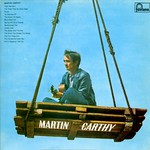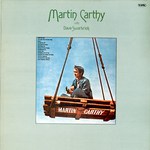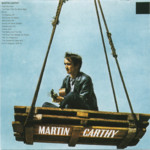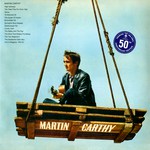> Martin Carthy > Records > Martin Carthy
Martin Carthy
 |
Martin Carthy Fontana TL 5269 (mono LP, UK, 1965) |  |
 |
Topic Records 12TS340 (LP, UK, 1977) |
 |
Martin Carthy’s first record is similarly his first collaboration with Dave Swarbrick, even though he isn’t mentioned on the record title due to contractual obligations.
The second side of this album and the first side of Carthy’s Second Album were reissued in ca. 1970 with the title Round Up.
Produced by Terry Brown at Philips Recording Studios, Stanhope House near Marble Arch, London.
Musicians
Martin Carthy: vocals,
guitar [1-3, 5, 7-9, 11, 14];
Dave Swarbrick: fiddle [3, 12],
mandolin [6, 9, 14]
Tracks
Side 1
- High Germany (Roud 904; G/D 1:96) (2.31)
- The Trees They Do Grow High (Roud 31; Laws O35; G/D 6:1222) (3.31)
- Sovay (Roud 7; Laws N21; Henry H35) (2.09)
- Ye Mariners All (Roud 1191) (1.47)
- The Queen of Hearts (Roud 3195) (2.21)
- Broomfield Hill (Roud 34; Child 43; G/D 2:322; Henry H135) (2.51)
- Springhill Mine Disaster (4.21)
Side 2
- Scarborough Fair (Roud 12; Child 2; G/D 2:329) (3.25)
- Lovely Joan (Roud 592) (1.49)
- The Barley and the Rye (Roud 23268) (1.39)
- The Wind That Shakes the Barley (Roud 2994) (4.26)
- The Two Magicians (Roud 1350; Child 44; G/D 2:334) (3.23)
- The Handsome Cabin Boy (Roud 239; Laws N13; G/D 1:181) (3.24)
- And A-Begging I Will Go (Roud 286; G/D 3:488) (2.54)
Track 1 trad., credited as Cecil Sharp;
Tracks 2, 5, 6, 8, 11 trad. arr. Martin Carthy
Tracks 3, 12 trad. adapted A.L. Lloyd;
Tracks 4, 10, 13 trad.
Track 7 Ewan MacColl, Peggy Seeger
Tracks 9, 14 trad. arr. Martin Carthy, Dave Swarbrick
Notes by Ian Campbell from the original LP
There is now no fair sized town in Britain without at least one folk song club, and few large halls which have not presented their share of successful folksong concerts. Go to any folk song club, and in the course of an evening you are likely to hear a variety of traditional and contemporary songs sung by a hard core of experienced residents, "floor singers" and probably at least one visiting professional folk-singer, who, because he is not strictly a traditional singer but a revivalist, probably prefers to call himself a folksong singer. A nice distinction.
Perhaps one of the most popular singers in this category is Martin Carthy. Despite his youth, he is practically a foundation member of the present folksong revival. Like so many of his contemporaries, his interest initially stemmed from skiffle, and it is nearly eight years since he first started performing in public.
After three years with the Thameside Four, with a growing repertoire of British traditional songs, he decided to meet the increasing demands around the London clubs for his appearance as a solo artist. Although he has worked occasionally within a group since then, on one occasion with Rory McEwen and Lisa Turner and fleetingly with the 3 City 4, it is as a solo artist that he had made his biggest impact.
His work has been influenced by many singers and instrumentalists, which is as it should be, and there are few of the younger singer-guitarists who in their turn can deny his influence on their playing. His interest in the art of accompaniment is known and respected throughout the world of folk music, and as a result, many leading singers like to call upon his services in this capacity. In the songs he sings the words are given prime importance, his phrasing controlled in the only sensible way, by the meaning of the words and never by the rhythm of the guitar. Although in his time he has taken his songs from all over the English speaking world, his tendency is now more and more towards the English tradition, a tendency from which both he and the tradition can benefit.
Ian Campbell

